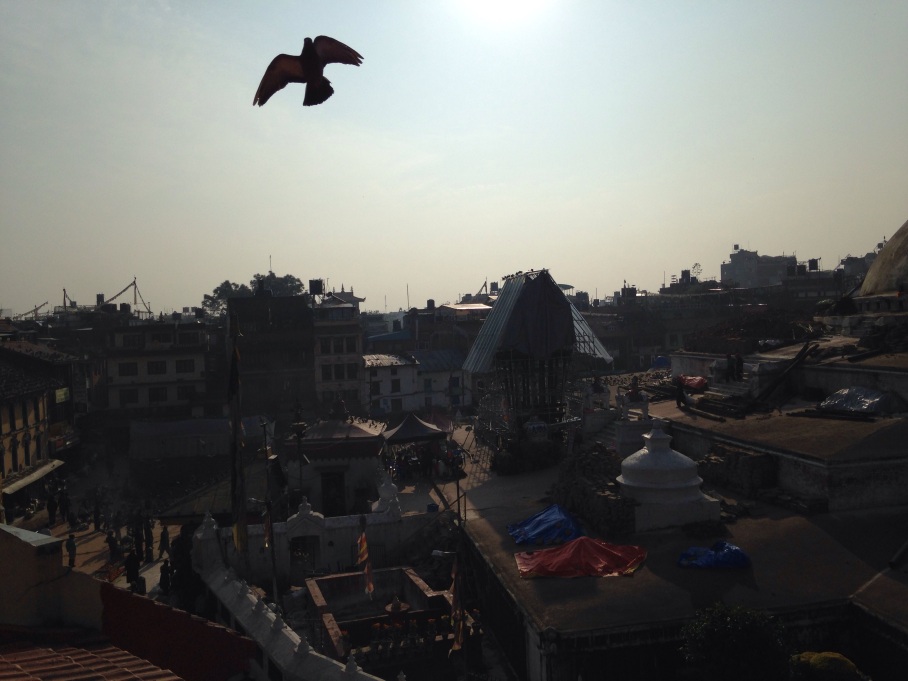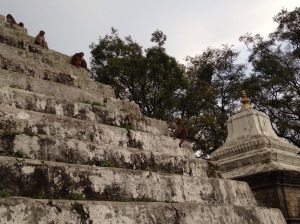 My first morning in Kathmandu looks down from a guesthouse rooftop garden on the grand opening day of Dashain, the country’s greatest and holiest festival, observed by both the Hindu and Tibetan Buddhist spiritual traditions that flourish here.
My first morning in Kathmandu looks down from a guesthouse rooftop garden on the grand opening day of Dashain, the country’s greatest and holiest festival, observed by both the Hindu and Tibetan Buddhist spiritual traditions that flourish here.
I watch with wide but sleepy eyes as vast flocks of pigeons fill the spaces between Heaven and Earth while Buddhists reverently circumambulate the intensely holy, quake-crumbled Boudha Stupa, reaching out their right hands to spin the prayer wheels set in the temple’s outer wall.
The Stupa’s pinnacle (“Sendok” in Sherpa language) that once reached skyward from the temple roof is gone now, shattered by the massive Earthquake that clobbered this monetarily poor but culturally and spiritually rich country last spring, but as with all things that go- which is to say: All Things- something new will soon take its place. We are privileged to be guided today through the holy places of Kathmandu by a Hindu scholar named Manohari, who explains that the new materials used to restore the Stupa must be sanctified through Prana Patrishka (my phonetic spelling): ceremonies and mantras to imbue ordinary objects with life and spirit.
Our team of intrepid relief trekkers embarks on a potholer coaster ride over the chaotic, chassis- rattling track of Kathmandu’s roadways, which are lined with buses, cars, and motorbikes waiting 24 hours or more for the few liters of gas allotted them by a government grappling with a crippling fuel shortage. Some blame India, claiming that unofficial border blockades are responsible, and India in turn is pissed off about the finger pointing. Relations are a bit strained.
There is sightseeing, eating, and last-minute shopping for trekking and mountaineering gear in the Thamel district. There are raggedy rickshaws; poor, toeless beggars; and an endless street cacophony. Within 30 seconds of walking out of the currency exchange I receive the honor of becoming the first (and so far only) member of our group to be gritted by a local when I follow a woman and her small boy into a little store to grant her request for powdered milk to feed her hungry baby. I pay the shopkeeper 475 rupees ($4.75) for the formula, irritably refuse the woman’s additional request for a new baby bottle (she has already brandished one at me during her pitch), and wander back to the street asking myself if mother’s milk could possibly be a scam. Of course it could, I answer me.
I ask Jerry if Kathmandu has a black market for baby formula and am not even a little bit surprised when he tells me there is. Err on the side of caution, I guess. I can reason that I was swindled to the tune of $4.75, or I can understand that a woman in a very poor country tricked me into subsidizing her black market baby formula career because to her I am a Rockefeller and a Vanderbilt walking down the street in a single pair of pants. C’est la vie.
At sunset we find ourselves watching cremations across the Bagmati River (“Bagmati means “tiger’s mouth,” because according to Hindu tradition this holy river, which merges with the Ganges, originates from that orifice of that animal.
Manohari has brought us to Pashupatinath, a vast, rhesus monkey infested, smiling Sadhu haunted Hindu temple complex. Looking out across the river on the cremation yard, I watch a son, dressed all in white, lovingly and dutifully feed the purifying fire beneath his father’s charred, smoking corpse as a rhesus monkey capers on the red tin roof overhead, raising a ruckus as only a monkey knows how. Close by another white clad family is preparing a loved one for the pyre, washing his feet in the holy river. All of Kathmandu’s Hindus will take their final foot baths here.
Later, over pizza and beer back in Boudha, one of our crew mentions how he felt for the families at the cremation yards, enacting their personal death rituals for the audience of tourists across the river. As I listen, my mind’s eye pans back and forth between the scenes at the cremation ghats- a son soaking straw in a holy river to facilitate the slow burn necessary to transform a beloved form into a heap of ash- and the memory of saying goodbye to my own father’s body still on his deathbed, leaving him to be carted off by a faceless undertaker I never met.
In America we don’t usually send each other off with foot washing and marigold strewing and fire tending, and it’s ok that we don’t. We generally observe life’s greatest transition with strict privacy, squeamishness, excessive lamentation, and a good deal of whistling past the graveyard, and we don’t much like to put on a show for the folks across the river. I will underscore this cultural contrast by admitting how hard I had to work to overcome the feeling that merely mentioning my father’s death here is a breach of family privacy.
It’s time for bed. Things are getting different for our group: we are heading for the hills, trading chaotic streets for high Himalayan passes, funeral smoke for cumulus cloud. I’ll write when I can.
(For info on taking a trip with Skychasers visit http://www.skychasersworld.com)
